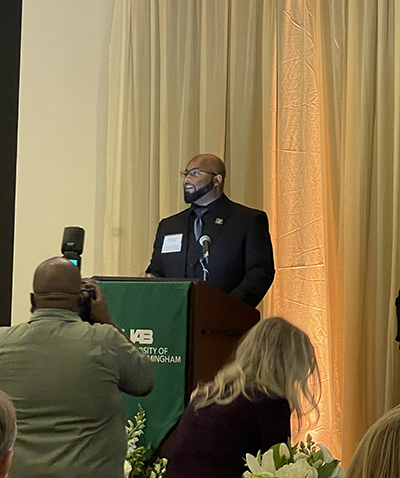Written by Christina Crowe
Jervaughn Hunter received the 2022 UAB Alumni Rising Star Award along with four other recipients on Friday, September 23. Hunter graduated in 2017 with a Bachelor of Science from the Department of Biomedical Engineering in the UAB School of Engineering. He is currently a graduate student and researcher at the University of California, San Diego (UCSD), pursuing a Ph.D. He returned to the UAB campus to participate in the awards event, and was joined by Alan Eberhardt, Ph.D., Professor, BME.
Hunter is from a small town in Mississippi, Port Gibson, and graduated as his high school’s valedictorian. While he was at the top of his graduating class, he recalls his first semester at UAB as being very challenging.
“I failed my first BME class at UAB, an intro class,” he says. “I had a lot of doubt. But due to UAB’s programs and the community I built, I was able to find people to work with me and build up my confidence.”
Hunter had the opportunity to work with Timothy Wick, Ph.D., director of the School of Engineering Project Lab, where he learned about biomedical engineering. There he discovered hospital assist devices, prosthetics, and more. Hunter also mentions work with former career services director Desland Robinson and classes taken with BME professor Ho-Wook Jun, Ph.D., as pivotal to his growth in the field of BME.
“Dr. Jun’s was one of the more fascinating classes I took, learning about engineering the human body treat and cure disease.”
As a senior, his design project took a materials approach, with his team creating a stethoscope cover to help prevent disease. During his final semester at UAB, Hunter applied for an NIH post-baccalaureate research education program (PREP) and was selected. “I jumped at the opportunity—it was the only way to get wet lab research experience after graduating,” Hunter says. During PREP Hunter worked for a year in the lab of Jianyi “Jay” Zhang, M.D., Ph.D., T. Michael and Gillian Goodrich Endowed Chair of Engineering, in the BME Department, pursuing his personal interest in cardiovascular diseases.
“I was thinking about the healthcare disparities that plague my hometown: kidney and cardiovascular disease, and diabetes,” he recalls. “I knew I never wanted to be a medical doctor but learning about BME for innovative therapeutics to treat diseases was fascinating and I wanted to use the experiences that I gained to give back to communities such as my own.”
During his tenure with Zhang, Hunter researched pluripotent stem cells, and worked on animal research for the first time. The work resulted in his first-ever scientific manuscript, an article in Circulation.
“I was very appreciative to his lab for all of the exposure I had not seen in the classroom or during undergrad,” he says. “It grew my affinity for translational research.”
Hunter credits the UAB community for making him feel like part of a family. He recognizes other BME students, student support services, his fraternity Omega Psi Phi Fraternity, Inc., and his participation in community service on campus, which helped him be involved in the greater Birmingham community.
Hunter has participated in several extracurricular events to promote biomedical engineering to high school students. “I remember not knowing what BME was,” he says. “I really do like getting out and doing outreach and sharing with other students that may have not had this exposure.”
He’s interested in teaching about health disparities and co-founded a nonprofit in his hometown with several friends, teaching the local community about mental and physical health, advocacy, financial literacy, and career exploration.
Hunter also took part in a Pathways to STEM program working with undergraduates as a graduate advocate and is an advocate for scientific communication. His career plans include entering the biotech industry, and he is also interested in clinical trials management, “designing appropriate clinical trials that encompass everyone.”
Hunter has a lot to celebrate: In addition to the Rising Star award, he recently received the news that he has been chosen as a Siebel Scholar for 2023, a UCSD program established by the Siebel Foundation, “to recognize the most talented students at the world’s leading graduate schools of business and computer science in ten universities.” Bioengineering was added as its newest program, in 2009, at UCSD and several other institutions.
